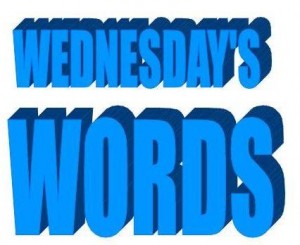Wednesday’s Words: The Slang Game
 Well cut off my legs and call me shorty! That particular bit of slang came from the 1940s. Can you guess what decades the rest of these came from?
Well cut off my legs and call me shorty! That particular bit of slang came from the 1940s. Can you guess what decades the rest of these came from?
- Heave, meaning to vomit
- Bitch, meaning to gripe
- Having the hots for someone
- To finger someone
- To come clean
- Groovy
- Sore, meaning angry
- Babe, meaning an attractive female
- Broad, meaning a woman
- A scream, meaning something hilarious
- Teenager
- Dough, meaning money
- Beef, meaning complaint
- Baby, meaning one’s sweetheart
- Bull, meaning bull crap
- Joe, meaning coffee
- John, meaning bathroom
- Hip, meaning cool
- Double-cross
- Dick, meaning private detective
- “What’s eating you?”
Okey-doke. Don’t get in a lather. I’m a hep-cat and won’t take a powder before I give you the poop. 1-3 are from the 1940s. 4-11 all date back to the 1930s. 12-17 are from the 1920s. 18 dates back to 1915. and 19-21 were used as early as 1900.
Now I have to go see a man about a dog.



Love these! I love reading old books and coming across some of these when they were common, pop parlance. For real slang joy, read Raymond Chandler or Dashiell Hammet. When I do critiques, I constantly warn writers about slang and pop culture references. Some may become timeless, and some may end up dating your work badly.
And don’t you just love the current Progressive Insurance commercial with the old dude saying something like “Okey MsSmokey” and “Diggity”? LOL!
If only I had more time, I could probably figure some of them out – maybe.
Ah, the life of the newly returned to working but got used to being a stay at home mom. Working is the easy part. The rest is a bugger to juggle and get through and get everything done.
Hi Pat. I’m surprised at how far back these expressions go. I would have guessed the Sixties for groovy. If you sprinkle many of these words in your dialogue, it starts to sound like Frank Sinatra did in his ad-lib conversation at concerts.
I guessed 60s for a couple of them that were much older. Fun stuff, Pat. And as Kat said, they can easily date a piece of writing. (Or a film.)
So, do we want to write with timelessness or write for the present only?
The settings are the same on these atuncocs. They are default. The only difference is risklevel, but you should set it yourself. We can’t give any financial advice to you. RiskLevel has nothing to do with trading frequency. The only difference between results is the broker’s differences. We recommend you to try several brokers’ demo atuncocs to compare and select the best.
I too was surprised by how far back some of these expressions go. Some are so common, they no longer seem like slang, such as double-cross.